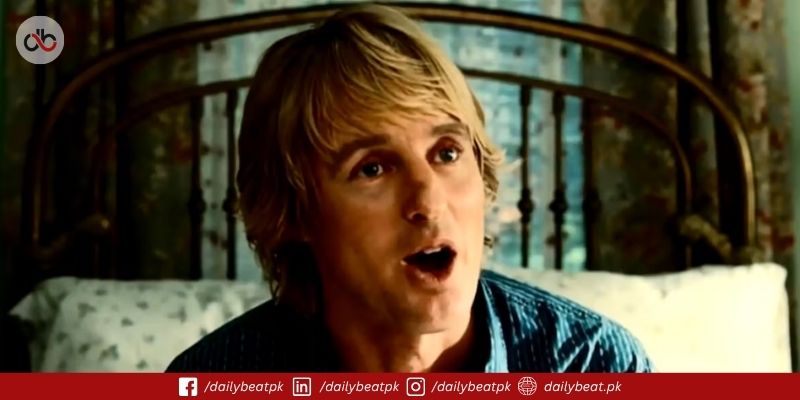When most people think of Owen Wilson, one word comes to mind: “wow.” It’s become a pop culture catchphrase tied to his name. But reducing Wilson’s acting career to that single word is a mistake. He’s not just a comic actor or a quirky sidekick. He’s much more than a string of romantic comedies and buddy films. Behind that charming smile and laid-back delivery lies a deeply nuanced actor with range, subtlety, and emotional intelligence.
Owen Wilson deserves more respect than he gets.
Owen Wilson: The Easygoing Comic… Or So We Thought
For many, Owen Wilson is the funny guy with the messy blonde hair and that unique voice. He’s instantly recognizable and instantly likable. His comedy often relies on timing, physical awkwardness, and understated delivery. Films like Wedding Crashers, Zoolander, and Starsky & Hutch shaped his image as a reliable source of humor.
However, looking closely, you will see that Wilson never plays his characters flat. Even in loud, outrageous comedies, there’s often a softness and vulnerability in his roles. That emotional thread is easy to miss because it’s not loud or obvious, but always there.
In Wedding Crashers, for example, his character isn’t just there for laughs. He experiences heartbreak, emotional confusion, and loneliness. Owen Wilson brings that across in quiet moments, the way he pauses and his voice cracks slightly when he’s rejected. This isn’t slapstick. It’s subtle, emotional acting masked in a feel-good comedy.
A Quiet Master of Character Nuance
Some actors perform with big gestures and dramatic monologues. Owen Wilson, on the other hand, works with quiet detail. He uses small expressions, thoughtful pauses, and that signature soft tone to create characters who feel real.
His role in Midnight in Paris is a perfect example. In that film, he plays a nostalgic, romantic writer who longs for a different time. Wilson doesn’t push the emotion. He doesn’t shout or cry. But you can feel every bit of longing, wonder, and confusion in his performance. His eyes tell the story. His tone shifts slightly when he talks about Paris at night. That’s real acting. That’s depth.
His work with director Wes Anderson also showcases this emotional subtlety. In The Royal Tenenbaums, Wilson plays Eli Cash, a character who is eccentric and insecure. Instead of leaning too hard into the character’s quirks, Wilson plays him with restraint. You can see the sadness beneath the surface. He delivers funny lines, but with a sense of personal loss. It’s comedy and tragedy simultaneously, and very few actors can balance that.
Breaking Away from Typecasting
Owen Wilson has often been typecast as the lovable slacker or the laid-back best friend. But that’s not because he lacks talent. It’s because he’s so good at making it look easy. Hollywood tends to keep actors in boxes, especially when they’re successful at a certain type of role.
Still, Wilson has taken bold steps outside that box. His performances in Behind Enemy Lines, No Escape, and Wonder prove that he can handle drama, tension, and complex emotions just as well as comedy.
In Wonder, he plays the father of a child with facial differences. His performance is gentle, supportive, and heartfelt. He doesn’t try to steal the spotlight. Instead, he lets the emotion flow naturally. That’s a rare skill. He portrays love and vulnerability in a way that feels authentic and grounded. You believe he’s a real dad. You believe he’s hurting and hoping at the same time.
Voice Work: Subtlety Without a Face
Many people overlook voice acting when judging an actor’s talent. But voicing an animated character requires clarity, control, and emotional expression without physical presence. Owen Wilson delivers this beautifully in the Cars franchise. His role as Lightning McQueen evolves over the films. The character goes from cocky and arrogant to humble and wise.
Wilson manages to show that entire emotional arc through voice alone. That takes skill. His voice becomes the heart of the story. Kids relate to Lightning McQueen not just because he looks cool, but because Wilson gives him emotion, growth, and depth.
The “Wow” Is Just a Surface
The world loves to poke fun at Owen Wilson’s “wow” line. There are entire video compilations of him saying it. But focusing only on that catchphrase misses the bigger picture. The “wow” isn’t the performance. It’s just a part of his unique charm.
Ironically, that repeated line shows just how consistent Wilson is. He brings himself to every role, not lazily, but in a grounded, believable way. He doesn’t pretend to be someone else entirely. He blends character with honesty. That’s what makes his roles memorable.
Sometimes, acting isn’t about total transformation. Sometimes it’s about connection, and Wilson connects with audiences deeply. You don’t leave his films feeling like you watched a show. You feel like you spent time with someone real.
Consistency Can Be a Form of Genius
Owen Wilson’s genius isn’t loud. He doesn’t chase Oscars or dramatic performances designed for awards. He picks roles that suit him and then adds layers to them. That takes confidence. That takes understanding.
Being consistently good at something is brilliance. Wilson’s success isn’t based on hype. It’s based on audience trust. People watch his movies because they know they’ll see someone authentic. That kind of connection is rare in Hollywood.
Final Thoughts: Time to Rethink Owen Wilson
Owen Wilson has been in the industry for over two decades. He’s co-written Oscar-nominated scripts. He’s starred in blockbuster comedies, heartfelt dramas, and quirky indie films. He’s made millions laugh and quietly made them cry, too.
It’s time we stopped seeing him as the guy who says, “Wow.” It’s time we recognize the emotional intelligence behind his roles. His performances are subtle. However, they’re also full of meaning.
Owen Wilson is not just a comic actor. He’s a performer with depth, range, and emotional truth. And that deserves a little more “wow” from all of us. The kind that comes from genuine respect.















